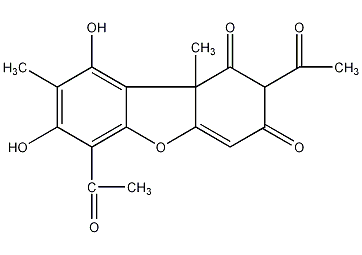
Structural formula
| Business number | 03JS |
|---|---|
| Molecular formula | C18H16O7 |
| Molecular weight | 344.32 |
| label |
Lichenic acid, usnic acid, natural flavors |
Numbering system
CAS number:125-46-2
MDL number:MFCD00065294
EINECS number:231-456-0
RTECS number:HP5270000
BRN number:None
PubChem ID:None
Physical property data
1. Character: yellow rhombic prism crystal (acetone)
2. Melting point (℃): 192-194 (crystallized in ethanol) 201-204 (crystallized in inert solvent)
3. Optical rotation: +509.4° (c=0.697, chloroform)
4. Solubility: (g/100ml water)<0.01, acetone 0.77, ethyl acetate Ester 0.88, ethanol 0.02, furfural 7.32, sugar alcohol 1.21 (25℃)
5. Solubility: easily soluble in chloroform and glacial acetic acid, difficult to dissolve in hot alcohol.
Toxicological data
Acute toxicity data: mouse skin LC50: 75mg/kg; mouse intravenous LC50: 25mg/kg; rabbit oral LD: >500 mg/kg.
Mutagenicity data: Bacteria – E. coli DNA: 20 umol/L; Mammalian – species unknown cells – not otherwise specified: 3750 ug/L.
Ecological data
None
Molecular structure data
None
Compute chemical data
1. Reference value for hydrophobic parameter calculation (XlogP): 1.4
2. Number of hydrogen bond donors: 2
3. Number of hydrogen bond acceptors: 7
4. Number of rotatable chemical bonds: 2
5. Number of tautomers: 147
6. Topological molecular polar surface area 118
7. Number of heavy atoms: 25
8. Surface charge: 0
9. Complexity: 708
10. Number of isotope atoms: 0
11. Determine the number of atomic stereocenters: 0
12. Uncertain number of atomic stereocenters: 2
13. Determine the number of chemical bond stereocenters: 0
14. Number of uncertain chemical bond stereocenters: 0
15. Number of covalent bond units: 1
Properties and stability
1. This product is a broad-spectrum antibiotic that has a strong inhibitory effect on most Gram-positive bacteria and can also inhibit the growth of tuberculosis bacteria. If combined with a small amount of streptomycin, its inhibitory effect on tuberculosis bacteria can be greatly enhanced.
2. Light to golden yellow needle-shaped crystals, easily soluble in chloroform and glacial acetic acid, insoluble in hot alcohol, tasteless, odorless, non-toxic, non-corrosive and non-volatile.
Storage method
Sealed storage at room temperature
Synthesis method
1. Usnea barbata Wigg. is commonly called Usnea barbata Wigg. Tree moss. Extracts of oak moss and tree moss using benzene or ethanol as solvent. The extract contains a large amount of depsiphenols and depsisol compounds. These compounds have relatively large molecular weights, are non-volatile, and do not have any aroma. They have little contribution to the aroma of oakmoss and treemoss products and are often used.Through a series of treatments, one of the above by-products, lichenic acid, can be obtained.
2.Dry the lichen and then heat and extract it with acetone as the solvent. Collect the extract, concentrate it to a small volume, and let it cool. Usnic acid can crystallize out, and the pure product can be obtained after recrystallization.
Purpose
1. Preparations containing this product have obvious therapeutic effects on cancer patients. It has certain clinical efficacy against malaria. It has certain effects on trauma, burns and skin diseases, cervical inflammation, nipple cracks, and prevention of perineal rupture. In addition, it can also be used as a raw material for the antibiotic “Pyridoxine”.
2. It is used to stop bleeding, antibacterial, anti-inflammatory, wound healing, prevent dental caries, remove dental plaque, enhance human immunity, and has good curative effect on oral ulcers and vaginitis. Often used as an additive in toothpaste and cosmetics.
3.Usnic acid is a cosmetic additive approved by CTFA. It is a broad-spectrum antibiotic with powerful activity against most Gram-positive bacteria. Inhibitory effect, concentration of 50 μ g.ml-1 can completely inhibit bacterial growth and is used as a highly effective preservative in cosmetics. It has a selective inhibitory effect on Streptococcus, the main bacteria causing oral diseases and dental caries. Usnic acid is effective in treating various skin diseases such as burns, infections, psoriasis, etc.

 微信扫一扫打赏
微信扫一扫打赏

